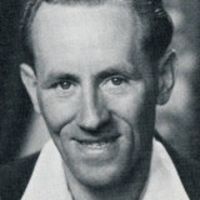George Tribe
Australia

INTL CAREER: 1946 - 1947
Full Name
George Edward Tribe
Born
October 04, 1920, Yarraville, Melbourne, Victoria
Died
April 05, 2009 (aged 88y 183d)
Also Known As
birth registered as George James Tribe
Batting Style
Left hand Bat
Bowling Style
Left arm Wrist spin
Height
5ft 7in
Education
St. Augustine's School, Yarraville
George Tribe had the ability to mix up chinamen with orthodox left-arm spinners, and with his disciplined batting and brilliant fielding at short leg he was a true allrounder. His early career was stifled by WW2 but as soon as normality returned he forced his way into the Victoria side, taking 40 wickets at 19.02 in 1945-47, his first season. He was picked for the first two and last Tests of the 1946-47 Ashes series but failed to make an impression and was discarded. The final Test was his last match in Australia.
In 13 games for Victoria, he took 86 wickets at 19.25 but, frustrated at the lack of opportunities, he moved to England and signed for Milnrow in the Central Lancashire League. In his first season in 1947 he took 136 wickets, followed by a record 148 wickets in 1948 and 150 in 1949. In 1950 he switched to Rawtenstall where he stayed for two seasons. His class was underlined when in 1949-50 he took 99 wickets (more than twice as many as any of his team-mates) at 17.22 on a tour of India with a Commonwealth team.
Tribe was an engineer during the close season and in 1951 he was hired by a Northampton-based firm. In 1952 he joined the county (he played once for them the previous summer) and in the next eight seasons he achieved the double of 1,000 runs and 100 wickets seven times. He made a massive contribution to the county and was an instrumental figure in its recovery from no-hopers to title contenders.
Tribe was also a good AFL player, making his debut for Footscray Football Club in 1940 and going on to play 66 games before his career ended with his move to England.
Martin Williamson
Terms of Use|Privacy Policy|Your US State Privacy Rights|Children's Online Privacy Policy|Interest - Based Ads|Do Not Sell or Share My Personal Information|Feedback
© 2024 ESPN Sports Media Ltd. All rights reserved